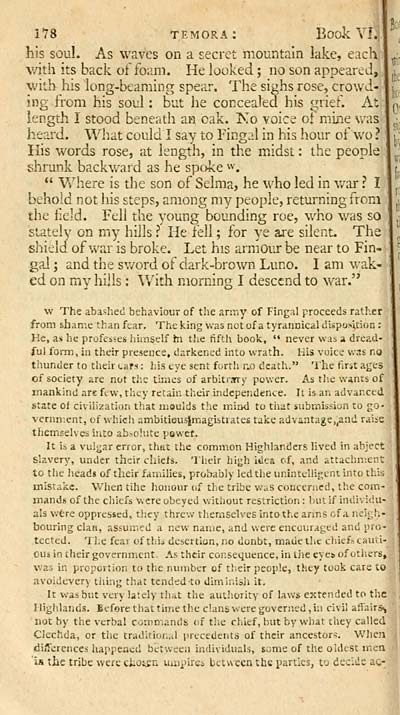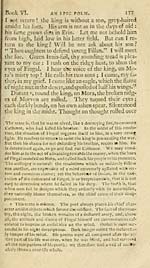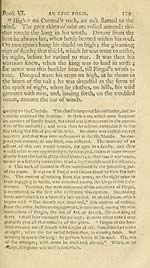Download files
Complete book:
Individual page:
Thumbnail gallery: Grid view | List view

178 temora: Book VI.;
his soul. As waves on a secret mountain lake, eacK
with its back of foam. He looked ; no son appeared,
with his long-beaming spear. The sighs rose, crowd-
ing from his soul : but he concealed his grief. At
length I stood beneath an oak. Ko voice of R-!ij:ie was
heard. What could I say to Fingal in his hour of wo ?
His words rose, at length, in the midst : the people
shrunk backward as he spoke "'. 1 1
" V>^here is the son of Selma, he who led in v/ar ? I I .r
behold not his steps, among my people, returning from I j
the field. Fell the young bounding roe, who v/as so f
stately on my hills ? He fell ; for ye are silent. The i
shield of war is broke. Let his armour be near to Fin-
gal ; and the sword of dark-brown Luno. I am wak-
ed on my hills : With morning I descend to war."
w The abasl-.ed behaviour of the army of Fingal proceeds rather
from shanie than fear. The king was not of a tyrannical disposition :
Ke, as he professes himself hi tJic fifth book, '* never was a dread-
ful form , in their presence, darkened into wrath. His voice was no
thunder to their earn : his eye sent forth w death." The hrit ages
of society are not tl;e tinies of arbitrarry power. As tlie wants of
mankind are few, they retain their independence. It is an advanced
state of civilization that moulds the mind to that submission to go-
vernn^ent, of which ambitious|magistrates take advantage,,and raise
themselves hito absolute powct.
It is a vulgar error, that the common Highlanders lived in abject
slavery, under their chiefs. Their high idea of, and attachment
to the liead« of their families, probably led the unintelligent into this
mistake. When tihe honour of tlie tribe wus concerned, the com-
mands of the chiefs were obeyed without restriction : hut if individu-
als wtre oppressed, they threw themselves into the arms of a neigh-
bouring clan, assumed a new name, and v.ere encouraged and pro-
tected. 1 he feai of thij desertion, no donbt, made tlie chiefs cauti-
ous in their government. As their consequence, in the eyes of others,
was in proportion to the number of tlieir people, they took care to
avoidevery thing that tended to diminisji it.
It was but very lately that the authority of laws extended to the
Highlands. Before that tiine the clans were governed , hi civil affairs^
not by the verbal commands of tlie chief, but by what they called
Clechda, or the traditionj precedents of their ancestor^. When
differences happened between individuals, some of the oldest men
is the tribe were ciiOi^n uuiinrcs bct« een the parties, tu decide ac-
his soul. As waves on a secret mountain lake, eacK
with its back of foam. He looked ; no son appeared,
with his long-beaming spear. The sighs rose, crowd-
ing from his soul : but he concealed his grief. At
length I stood beneath an oak. Ko voice of R-!ij:ie was
heard. What could I say to Fingal in his hour of wo ?
His words rose, at length, in the midst : the people
shrunk backward as he spoke "'. 1 1
" V>^here is the son of Selma, he who led in v/ar ? I I .r
behold not his steps, among my people, returning from I j
the field. Fell the young bounding roe, who v/as so f
stately on my hills ? He fell ; for ye are silent. The i
shield of war is broke. Let his armour be near to Fin-
gal ; and the sword of dark-brown Luno. I am wak-
ed on my hills : With morning I descend to war."
w The abasl-.ed behaviour of the army of Fingal proceeds rather
from shanie than fear. The king was not of a tyrannical disposition :
Ke, as he professes himself hi tJic fifth book, '* never was a dread-
ful form , in their presence, darkened into wrath. His voice was no
thunder to their earn : his eye sent forth w death." The hrit ages
of society are not tl;e tinies of arbitrarry power. As tlie wants of
mankind are few, they retain their independence. It is an advanced
state of civilization that moulds the mind to that submission to go-
vernn^ent, of which ambitious|magistrates take advantage,,and raise
themselves hito absolute powct.
It is a vulgar error, that the common Highlanders lived in abject
slavery, under their chiefs. Their high idea of, and attachment
to the liead« of their families, probably led the unintelligent into this
mistake. When tihe honour of tlie tribe wus concerned, the com-
mands of the chiefs were obeyed without restriction : hut if individu-
als wtre oppressed, they threw themselves into the arms of a neigh-
bouring clan, assumed a new name, and v.ere encouraged and pro-
tected. 1 he feai of thij desertion, no donbt, made tlie chiefs cauti-
ous in their government. As their consequence, in the eyes of others,
was in proportion to the number of tlieir people, they took care to
avoidevery thing that tended to diminisji it.
It was but very lately that the authority of laws extended to the
Highlands. Before that tiine the clans were governed , hi civil affairs^
not by the verbal commands of tlie chief, but by what they called
Clechda, or the traditionj precedents of their ancestor^. When
differences happened between individuals, some of the oldest men
is the tribe were ciiOi^n uuiinrcs bct« een the parties, tu decide ac-
Set display mode to: Large image | Transcription
Images and transcriptions on this page, including medium image downloads, may be used under the Creative Commons Attribution 4.0 International Licence unless otherwise stated. ![]()
| Early Gaelic Book Collections > Ossian Collection > Poems of Ossian, the son of Fingal > Volume 2 > (188) |
|---|
| Permanent URL | https://digital.nls.uk/77914973 |
|---|
| Shelfmark | Oss.54 |
|---|---|
| Attribution and copyright: |
|
| Description | Selected books from the Ossian Collection of 327 volumes, originally assembled by J. Norman Methven of Perth. Different editions and translations of James MacPherson's epic poem 'Ossian', some with a map of the 'Kingdom of Connor'. Also secondary material relating to Ossianic poetry and the Ossian controversy. |
|---|
| Description | Selected items from five 'Special and Named Printed Collections'. Includes books in Gaelic and other Celtic languages, works about the Gaels, their languages, literature, culture and history. |
|---|

